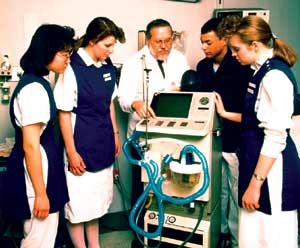Male nurses move beyond stereotypesEven in the midst of the counter-cultural 1960s, those who encouraged Mervin Helmuth in his vocational path must have known he was something of a pioneer. When Helmuth entered nursing school after completing a term in alternative service to the military draft, he was a very unlikely student: a person of Amish background pursuing education and training outside typical community expectations, and the first male to be accepted into a nursing program in the city of Fort Wayne, Ind. Helmuth had been asked by the director of nursing in the tuberculosis hospital where he fulfilled 1-W service whether he thought about continuing in nursing; he told her that he did not finish high school. After completing his assignment at the hospital, he stayed on an extra year, and completed requirements, including a GED, to allow him to get his foot in the door at a nursing school. Even after local publicity died down over his entrance to the School of Nursing at Parkview-Methodist Hospital he faced unique challenges. Without a formal high school education, he hadn’t developed consistent study habits. He also had to take a chemistry course, and arrange for different housing than his female counterparts. His family, however, was accepting; nursing, like school teaching, was viewed as “a legitimate reason to go on to school,” Helmuth said. In 1966, when Helmuth graduated second in a class of 75 and received his diploma in nursing, men represented less than one percent of the professional nursing population nationwide. In the decades since, the number of men who have chosen to enter the field has risen to 5.4 percent; of Goshen College’s 1,627 B.S.N. graduates to date, 68 male nursing graduates nearly reflect the national trend. Helmuth worked at Parkview Hospital as a nurse, but then decided to enroll at Goshen to earn a bachelor of science degree in nursing. He wasn’t the first male nursing student in GC’s program, but nursing professor Orpah Mosemann, with exceptional vision for the future of the program, asked Helmuth whether he would be interested in earning a master’s degree in order to teach at the college level. “Orpah saw men coming into the program, and wanted to encourage more to enter nursing, and felt they needed male role models in order to see men functioning in nursing,” said Helmuth. “I give her credit – she was the wisdom behind the nursing program, and she was a mentor for many people.” Helmuth went on to earn a master’s degree at the University of Florida (Gainesville) and returned to Goshen to join the teaching faculty. The reasons men are now choosing to go into the nursing profession are similar to those cited by women who go into the field: an interest in caring for sick individuals and promoting wellness, providing a needed service, relating closely to patients and families, endless opportunities for specialization and job variation. Nurses are also in demand, providing options and stability for graduates. “Economics and gender and cultural biases are [some] of the reasons that men have not come into nursing, but recently there has been more interest. And there are more males from other countries who are starting to look at nursing, and I find they don’t have the same hang-ups about men being nurses – largely centered around the stereotype of nurses being female,” said Helmuth. “Many of our male nursing students are also older than traditional-aged college students. It’s not very kosher yet for male high school seniors to tell people ‘I want to be a nurse,’ so consequently, even today, they don’t come to us straight from high school. They need to understand themselves a little better to go into a highly female profession. Then they are successful.” GC senior Jared Beasley completed an undergraduate degree in economics at another college before he realized, in part through experiences during training for and working as a technician in a hospital emergency room, that he wanted to pursue a vocation in nursing. His decision to go back to school to earn a B.S.N. was due in part to a “cost-benefit analysis” and also because “there is a lot about nursing that is wonderful. Stability: there’s a lot of job security in nursing. Opportunities are almost endless in this field … I did research and talked to people, and you can go anywhere with this degree: administration, hundreds of different clinical fields, home health, public health, school nursing. The pay is good, the benefits are good. I have never been so absolutely sure about a career move before.” There are some areas where men may face discrimination during their education, Helmuth said; some nursing programs do not allow men to go on to an obstetrics unit, for example, for clinical experience after they’ve done the same preparatory coursework. While women were most influential in Helmuth’s life as he chose his profession, he sees male nurses as providing excellent role models for young men whose gifts and interests would suggest a call to nursing. “The reasons men and women come into nursing are probably very similar. If people have this kind of desire to be able to help someone get well, or give them information that will help patients keep themselves well, then nursing is a good choice,” said Helmuth. “I find men to be just as caring as females. They just need to continue to overcome stereotypes and to know their own strengths.” |
|
|||
| Top of page |



